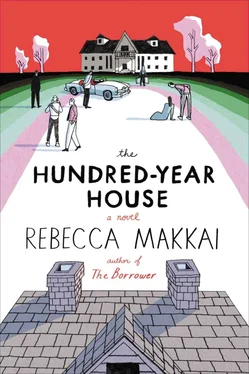Rebecca Makkai
The Hundred-Year House
for
— but not about—
Ragdale and Yaddo
with boundless gratitude
Nothing of her was left, except her shining loveliness.
— Ovid’s Metamorphoses, “The Transformation of Daphne”

For a ghost story, the tale of Violet Saville Devohr was vague and underwhelming. She had lived, she was unhappy, and she died by her own hand somewhere in that vast house. If the house hadn’t been a mansion, if the death hadn’t been a suicide, if Violet Devohr’s dark, refined beauty hadn’t smoldered down from that massive oil portrait, it wouldn’t have been a ghost story at all. Beauty and wealth, it seems, get you as far in the afterlife as they do here on earth. We can’t all afford to be ghosts.
In April, as they repainted the kitchen of the coach house, Zee told Doug more than she ever had about her years in the big house: how she’d spent her entire, ignorant youth there without feeling haunted in the slightest — until one summer, home from boarding school, when her mother had looked up from her shopping list to say, “You’re pale. You’re not depressed, are you? There’s no reason to succumb to that. You know your great-grandmother killed herself in this house. I understand she was quite self-absorbed.” After that, Zee would listen all night long, like the heroine of one of the gothic novels she loved, to the house creaking on its foundation, to the knocking she’d once been assured was tree branches hitting the windows.
Doug said, “I can’t imagine you superstitious.”
“People change.”
They were painting pale blue over the chipped yellow. They’d pulled the appliances from the wall, covered the floor in plastic. There was a defunct light switch, and there was a place near the refrigerator where the wall had been patched with a big square board years earlier. Both were thick with previous layers of paint, so Doug just painted right on top.
He said, “You realize we’re making the room smaller. Every layer just shrinks the room.” His hair was splattered with blue.
It was one of the moments when Zee remembered to be happy: looking at him, considering what she had. A job and a house and a broad-shouldered man. A glass of white wine in her left hand.
It was a borrowed house, but that was fine. When Zee and Doug first moved back to town two years ago, they’d found a cramped and mildewed apartment above a gourmet deli. On three separate occasions, Zee had received a mild electric shock when she plugged in her hair dryer. And then her mother offered them the coach house last summer and Zee surprised herself by accepting.
She’d only agreed to returned home because she was well beyond her irrational phase. She could measure her adulthood against the child she’d been when she lived here last. As Zee peeled the tape from the window above the sink and looked out at the lights of the big house, she could picture her mother and Bruce in there drinking rum in front of the news, and Sofia grabbing the recycling on her way out, and that horrible dog sprawled on his back. Fifteen years earlier, she’d have looked at those windows and imagined Violet Devohr jostling the curtains with a century of pent-up energy. When the oaks leaned toward the house and plastered their wet leaves to the windows, Zee used to imagine that it wasn’t the rain or wind but Violet, in there still, sucking everything toward her, caught forever in her final, desperate circuit of the hallways.
They finished painting at two in the morning, and they sat in the middle of the floor and ate pizza. Doug said, “Does it feel more like it’s ours now?” And Zee said, “Yes.”
—
At a department meeting later that same week, Zee reluctantly agreed to take the helm of a popular fall seminar. English 372 (The Spirit in the House: Ghosts in the British and American Traditions) consisted of ghost stories both oral and literary. It wasn’t Zee’s kind of course — she preferred to examine power structures and class struggles and imperialism, not things that go bump in the night — but she wasn’t in a position to say no. Doug would laugh when she told him.
On the bright side, it was the course she wished she could have taken herself, once upon a time. Because if there was a way to kill a ghost story, this was it. What the stake did to the heart of the vampire, literary analysis could surely accomplish for the legend of Violet Devohr.
Doug worked in secret whenever Zee left the house.
The folders on his desk were still optimistically full of xeroxed articles on the poet Edwin Parfitt. And he was still writing a book on Parfitt, in that its bones continued to exist, on forty printed pages and two separate diskettes. The wallpaper on his computer (Zee had set it up) was the famous photo of Parfitt kissing Edna St. Vincent Millay on the cheek.
But what Doug was actually sitting down to write, after a respectful silence for the death of both his career and the last shred of his manhood, was book number 118 in the Friends for Life series, Melissa Calls the Shots . He hid the document on his hard drive in a file called “Systems Operating Folder 30.” This book, unlike the Parfitt monograph, even had an actual editor, a woman named Frieda who called once a week to check his progress.
Doug’s stopover in the land of preteen literature was only the latest in a wretched chain of events — lack of money, paralysis on the monograph, failure to find employment, surreal indignity of moving into the coach house on Zee’s mother’s estate — but it would be the last. He would get this done and get paid, and then, because he’d be on a roll, he’d get other things done. He would publish the Parfitt book, he’d land a tenure-track post, and somehow along the way his hair would grow thicker.
He’d found Frieda through his friend Leland, a luckless poet who wrote wilderness adventures at the same press for “two grand a pop.” Leland talked like that, and he drank whiskey because Faulkner had. “They give you the entire plot,” he said, “and you just stick to the style. Really there is no style. It’s refreshing.” Leland claimed they took a week each, and Doug was enchanted with the idea of shooting out a fully formed book like some kind of owl pellet. He hadn’t written fiction since grad school, when he’d published a few experimental stories (talking trees, towns overcome with love) that now mortified him, even if Zee still adored them. But these publication credentials, plus Leland’s endorsement, landed him the gig. He knew nothing about wilderness adventure, but the press was suddenly short a writer for their middle-grade girls’ series — and desperate enough to hire a man. And so. Here he was.
The money would be nice. The coach house was free, but not the food, the car payments, the chiropractor. And that last wasn’t optional: If Dr. Morsi didn’t fix Doug’s back twice a week, he’d be unable to sit and work on anything at all. Frieda sent him four other books from the series, plus a green binder labeled “THE FFL BIBLE” with fact sheets on each character. “Melissa hates dark chocolate!” came several bullet points above “Melissa’s grandfather, Boppy, died of cancer in #103.”
“The first chapter,” Frieda told him on the phone, “introduces the conflict, which is the Populars on the team, will Melissa ever be goalie, et cetera .” He’d never met Frieda, but imagined she wore pastel blazers. “The second chapter is where you recap the founding of the club. Our return readers skip it, so you can plagiarize chunks from other volumes. The rest will be clear from the outline. Everything’s wrapped up at the end, but there’s that thread you leave hanging, ‘What’s wrong with Candy,’ which is where 119 picks up; 119 is being written already, so — as we tell all our writers — it’s important you don’t make uninvited changes to the world of the series.” Doug took comfort in the fact that this was clearly a memorized speech, part of the formula.
Читать дальше













